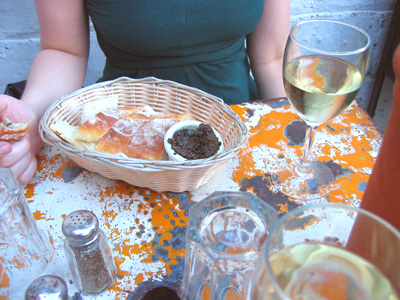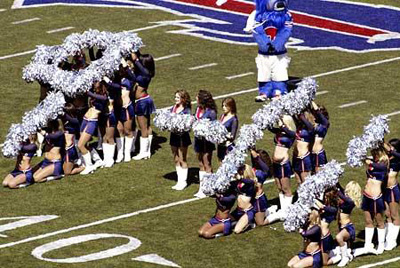Tonight I am thinking about the time long ago when a few of my brightest students asked — only partly in jest — why it was they ought to study philosophy. How, they wanted to know, would it help them get jobs? I told them — not at all in jest — that studying philosophy would do something much more valuable than help them get jobs: it would help them know what to do once they lost their jobs.
Tonight I'm thinking about those students and about everyone who's ever doubted the value of a liberal education, about all of us so fortunate to have access to so much knowledge and the luxury of so much time in which to acquire and digest it. I'm thinking about the nations and cultures that collapsed because their resources were redirected to wage pointless foreign wars. And I'm thinking about how my president can't think about the same things, because he was as a student and is still today just too incurious.
Tonight I did something I almost never do. I watched images on the news. There is little anymore on the news but images and the images tonight are horrific.
I am seeing a lot of blogs over the past few days expressing sympathy for and solidarity (whatever that is supposed to mean) with the victims of the hurricane. And while of course my heart aches to see lives ended and upended, what horrifies me is to watch on TV the unravelling of even the hope of a prosperous, democratic society in which the everyday lives of all its citizens are accorded as much importance as are abstract geopolitical concepts and the accrual of massive amounts of individual wealth.
This should not be and did not have to be a country in which one day of weather leaves people with absolutely nothing, not even a place to live. It also should not be a country in which bloggers can complain of the residents of the Mississippi delta that they didn't just get in their cars and check into hotels in Memphis. But no one who's ever seen rural Mississippi is surprised. No one who knows how ignorant most Americans are of the poverty that exists in this wealthiest nation is surprised. (Is Trent Lott surprised?)
And no one who's ever ended up on the wrong side of Canal Street at night is likely to be much surprised by the fact that African-Americans are now wading through the streets of New Orleans, looting businesses (
whites "find," blacks "loot"), strapped with firearms acquired somehow without the mandatory background check and waiting period. These are not likely images that will find their way into the jazz festival's brochure or Tulane's recruiting material, but unless you've had your head up your ass all your life they are not surprising images. Shocking, but not surprising.
The stories tonight are rumors of multiple rapes and deaths in the Superdome, in what is supposed to be a shelter, of people traveling hundreds of miles only to be turned away from the Astrodome. The stories tonight are of an unravelling of civil society, an unravelling that is the consequence of natural disaster intersecting with economic neglect and avarice. The stories are the sort you are accustomed to thinking could come only from a third-world country. Maybe they do. Maybe they come from a country well on its way to becoming third-world.
Maybe I'm wrong. I watched the L.A. riots when I was in my 20s and I watched the New York blackout looting on a battery-powered television with the covers pulled over my head when I was a teenager and I did not feel the way I do tonight. As awful as these events were, I didn't feel that they were harbingers of anything to come. Maybe I feel the way I do tonight because I'm older, because I love my wife, because I have for the first time felt the desire to be a father, because I have a better sense of the fragility of daily life, because I've finally felt my own mortality.
I hope so, but I don't think so. Most of what I'm both accustomed to having and am enjoying this very moment — shelter, clean water, easy access to good food, the free time to sit and write, air conditioning on a hot night, an Apple studio monitor, the company of two cats, and knowing that my wife is sleeping comfortably and safely just two rooms away, as well as the crucial belief that all of this will be the same tomorrow — would quickly disappear were we five feet-deep in sewage-infected water. Tonight I'm thinking it very well may come to pass in my children's lifetime if not my own that many of these things, maybe even the most basic, could be very hard if not impossible to have and enjoy.
Lillet and I have talked about expatriation almost since we started dating. Sometimes talk is serious, sometimes not so serious. When it is serious I think that it is more something we mean to do for our not-yet-born children than it is something for ourselves. It's an odd, disconcerting thing to think about for each of us, for reasons we share and a few we don't. Lillet's family have been Americans for many generations. Not so for me — one of my grandparents and all but one of my great-grandparents were not born in this country. Lately, I am hyper-aware of the contingency of my Americanness. Sometimes, it even feels a bit mercenary, as if Richard Dawkins' selfish gene were temporarily hopping continents. My ancestors came here so that I could have a better life, and now Lillet and I may return to where they came from so that our children can have a better life.
Mercenary or not, I cannot bear saying to any child of ours, here, this world, the one I saw on the news tonight, this is the world we've chosen to raise you in.

